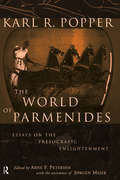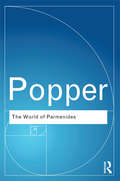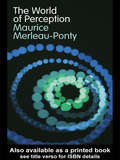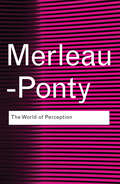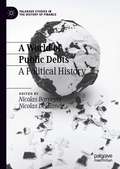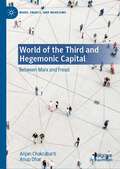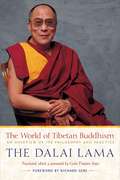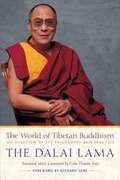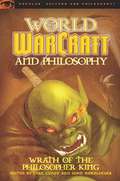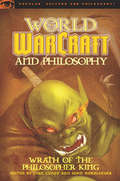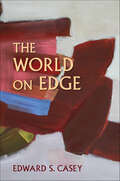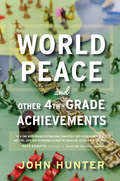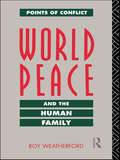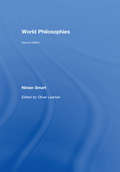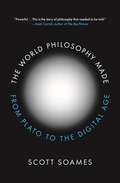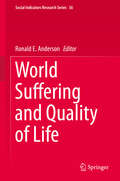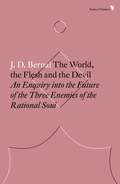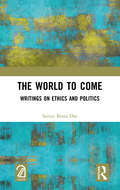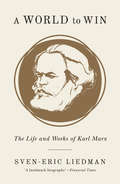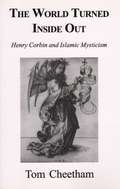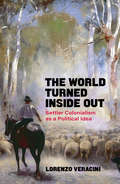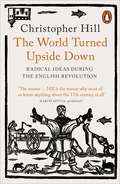- Table View
- List View
The World of Parmenides: Essays on the Presocratic Enlightenment (Routledge Classics Ser.)
by Karl PopperThis unique collection of essays, published together for the first time, not only elucidates the complexity of ancient Greek thought, but also reveals Karl Popper's engagement with Presocratic philosophy and the enlightenment he experienced in his reading of Parmenides. As Karl Popper himself states himself in his introduction, he was inspired to write about Presocratic philosophy for two reasons - firstly to illustrate the thesis that all history is the history of problem situations and secondly, to show the greatness of the early Greek philosophers, who gave Europe its philosophy, its science and its humanism.
The World of Parmenides: Essays on the Presocratic Enlightenment
by Karl Sir PopperWith a new foreword by Scott Austin 'I hope that these essays may illustrate the thesis that all history is or should be the history of problem situations, and that in following this principle we may further our understanding of the Presocratics and other thinkers of the past. The essays also try to show the greatness of the early Greek philosophers, who gave Europe its philosophy, its science, and its humanism.' - Karl Popper, from the preface The World of Parmenides is a brilliant exploration of the complexity of ancient Greek thought and science by one of the twentieth century’s leading philosophers. It reveals the great importance of Presocratic philosophy to Popper’s thought as a whole and shows the profound enlightenment he experienced reading not only Parmenides but the wider world of Greek science and philosophy including Xenophanes and Heraclitus. Edited by Arne F. Petersen, Associate Professor in the Faculty of Humanities, University of Copenhagen.
The World of Perception
by Maurice Merleau-Ponty'Painting does not imitate the world, but is a world of its own.'In 1948, Maurice Merleau-Ponty wrote and delivered on French radio a series of seven lectures on the theme of perception. Translated here into English for the first time, they offer a lucid and concise insight into one of the great philosophical minds of the twentieth-century.These lectures explore themes central not only to Merleau-Ponty's philosophy but phenomenology as a whole. He begins by rejecting the idea - inherited from Descartes and influential within science - that perception is unreliable and prone to distort the world around us. Merleau-Ponty instead argues that perception is inseparable from our senses and it is how we make sense of the world. Merleau-Ponty explores this guiding theme through a brilliant series of reflections on science, space, our relationships with others, animal life and art. Throughout, he argues that perception is never something learned and then applied to the world. As creatures with embodied minds, he reminds us that we are born perceiving and share with other animals and infants a state of constant, raw, unpredictable contact with the world. He provides vivid examples with the help of Kafka, animal behaviour and above all modern art, particularly the work of Cezanne.A thought-provoking and crystalline exploration of consciousness and the senses, The World of Perception is essential reading for anyone interested in the work of Merleau-Ponty, twentieth-century philosophy and art.
The World of Perception
by Maurice Merleau-Ponty'In simple prose Merleau-Ponty touches on his principle themes. He speaks about the body and the world, the coexistence of space and things, the unfortunate optimism of science – and also the insidious stickiness of honey, and the mystery of anger.' - James ElkinsMaurice Merleau-Ponty was one of the most important thinkers of the post-war era. Central to his thought was the idea that human understanding comes from our bodily experience of the world that we perceive: a deceptively simple argument, perhaps, but one that he felt had to be made in the wake of attacks from contemporary science and the philosophy of Descartes on the reliability of human perception.From this starting point, Merleau-Ponty presented these seven lectures on The World of Perception to French radio listeners in 1948. Available in a paperback English translation for the first time in the Routledge Classics series to mark the centenary of Merleau-Ponty’s birth, this is a dazzling and accessible guide to a whole universe of experience, from the pursuit of scientific knowledge, through the psychic life of animals to the glories of the art of Paul Cézanne.
A World of Public Debts: A Political History (Palgrave Studies in the History of Finance)
by Nicolas Barreyre Nicolas DelalandeThis book analyzes public debt from a political, historical, and global perspective. It demonstrates that public debt has been a defining feature in the construction of modern states, a main driver in the history of capitalism, and a potent geopolitical force. From revolutionary crisis to empire and the rise and fall of a post-war world order, the problem of debt has never been the sole purview of closed economic circles. This book offers a key to understanding the centrality of public debt today by revealing that political problems of public debt have and will continue to need a political response. Today’s tendency to consider public debt as a source of fragility or economic inefficiency misses the fact that, since the eighteenth century, public debts and capital markets have on many occasions been used by states to enforce their sovereignty and build their institutions, especially in times of war. It is nonetheless striking to observe that certain solutions that were used in the past to smooth out public debt crises (inflation, default, cancellation, or capital controls) were left out of the political framing of the recent crisis, therefore revealing how the balance of power between bondholders, taxpayers, pensioners, and wage-earners has evolved over the past 40 years. Today, as the Covid-19 pandemic opens up a dramatic new crisis, reconnecting the history of capitalism and that of democracy seems one of the most urgent intellectual and political tasks of our time. This global political history of public debt is a contribution to this debate and will be of interest to financial, economic, and political historians and researchers. Chapters 13 and 19 are available open access under a Creative Commons Attribution 4.0 International License via link.springer.com.
World of the Third and Hegemonic Capital: Between Marx and Freud (Marx, Engels, and Marxisms)
by Anjan Chakrabarti Anup DharThis book brings together Marxian philosophy and Lacanian psychoanalysis to argue that the hegemonic form of global capital is founded on the foreclosure of class and world of the third. The authors counterpose the world of the third to the mainstream notion of the third world, seen as a lacking other in desperate need of aid and development. Thus, for them, the hegemonic form of global capital is engendered through the foregrounding of the poor, victim third world and the foreclosure of the non-capitalist world of the third. Building on what they characterize as an ab-original reading of Marxian historical materialism and the Lacanian real, the authors seek to conceptualize a counter-hegemonic revolutionary subject as a basis for postcapitalist alternatives to the hegemonic form of global capital.
The World of Tibetan Buddhism
by Thupten Jinpa Richard Gere His Holiness the Dalai LamaWith characteristic humility, His Holiness the Dalai Lama begins this landmark survey of the entire Buddhist path by saying, "I think an overview of Tibetan Buddhism for the purpose of providing a comprehensive framework of the path may prove helpful in deepening your understanding and practice." In this book, the Dalai Lama delivers a presentation that is both concise and profound, accessible and engaging. As readers explore Tibetan Buddhism more fully than ever before, they will find in His Holiness a great friend and authority.
The World of Tibetan Buddhism: An Overview of Its Philosophy And Practice
by Dalai Lama Xiv Richard Gere Thupten JinpaIntroduces the basic beliefs of Buddhism, discusses the practices of loving and kindness, and looks at Vajrayana Buddhism and the path of tantra.
World of Warcraft and Philosophy: Wrath of the Philosopher King
by Luke Cuddy John NordlingerIn these lively essays, a specially commissioned guild of philosophers, including Yara Mitsuishi, Monica Evans, Tim Christopher, and Anna Janssen, tackles complex questions arising from WoW.
World of Warcraft and Philosophy
by Luke Cuddy John NordlingerRecognized by the Guinness Book of World Records as the most popular MMORPG (massively multiplayer online role-playing game) in videogame history, World of Warcraft is everywhere - from episodes of South Park and The Simpsons, to online series like Watch the Guild, accolades and awards from game critics, and prime-time commercials with Mr. T. Inevitably, such a cultural phenomenon triggers deeper questions. When does an assumed identity become real? Does the Corrupted Blood epidemic warn us of future public health catastrophes? What are the dangers when real life is invaded by events in the game? What can our own world learn from Azeroth's blend of primitivism and high-tech? In these lively essays, a specially commissioned guild of philosophers, including Yara Mitsuishi, Monica Evans, Tim Christopher, and Anna Janssen, tackles these and other complex questions arising from WoW.
The World on Edge (Studies in Continental Thought)
by Edward S. CaseyFrom one of continental philosophy's most distinctive voices comes a creative contribution to spatial studies, environmental philosophy, and phenomenology. Edward S. Casey identifies how important edges are to us, not only in terms of how we perceive our world, but in our cognitive, artistic, and sociopolitical attentions to it. We live in a world that is constantly on edge, yet edges as such are rarely explored. Casey systematically describes the major and minor edges that configure the human and other-than-human realms, including our everyday experience. He also explores edges in high- stakes situations, such as those that emerge in natural disasters, moments of political and economic upheaval, and encroaching climate change. Casey's work enables a more lucid understanding of the edge-world that is a necessary part of living in a shared global environment.
World Orders, Development and Transformation
by Eunice N. SahleThis book examines how hegemonic development ideas and practices emerged in the context of a changing world order post-1945. Moving beyond the concept of 'world orders', and arguing that development studies as a discipline is dominated by ahistorical, technocratic and assumed scientific perspectives, Eunice Sahle re-examines colonial concepts and practices that facilitate the reproduction of the North-South power divide, increasing human insecurity in the age of neoliberalism and securitization of development and security. In the process she provides a historicized understanding of development that draws on notions of power and ethics. Discussing multi-polarity in the light of the rise of China and Russia and China's increasing involvement in Africa, the emergence of the World Social Forum, global governance, the financial crisis and the impact of Barack Obama's presidency, the book engages with contemporary debates concerned with the transformation of the current world order. "
World Peace and Other 4th-Grade Achievements
by John Hunter&“His ideas will help anyone who has the courage to understand that a real education must go beyond filling in circles on a standardized test form.&” —Rafe Esquith, New York Times-bestselling author of Teach Like Your Hair&’s on Fire Can playing a game lead to world peace? If it&’s John Hunter&’s World Peace Game, it just might. In Hunter&’s classroom, students take on the roles of presidents, tribal leaders, diplomats, and military commanders. Through battles and negotiations, standoffs and summits, they strive to resolve a sequence of many-layered, interconnected scenarios, from nuclear proliferation to tribal warfare. Now, Hunter shares inspiring stories from over thirty years of teaching the World Peace Game, revealing the principles of successful collaboration that people of any age can apply. He offers not only a forward-thinking report from the frontlines of American education, but also a generous blueprint for a world that bends toward cooperation rather than conflict. In this deeply hopeful book, a visionary educator shows us what the future of education can be. &“The World Peace Game devised by fourth-grade teacher Hunter has spread from a classroom in 1978 to a documentary, a TED Talk, the Pentagon, and now finally a book, in which he describes the ways his students have solved political and ecological crises that still loom large in the world of adults . . . Hunter&’s optimism is infectious.&” —Publishers Weekly &“Inspired, breath-of-fresh-air reading.&” — Kirkus Reviews &“Hunter proves the value of &‘slow teaching&’ in this important, fascinating, highly readable resource for educators and parents alike.&” — Booklist
World Peace and the Human Family (Points of Conflict)
by Roy WeatherfordModern coverage of world events suggest that war and violence are key to contemporary society. History can convince us that it has ever been so, and many theorist of international relations argue that nothing is likely to change. Roy Weatherford argues that a profound change in social relations is imminent as national sovereignty yields to a democratic world culture, speaking a world language and living as a world wide family - the human family. For too long world peace has seemed a noble but unattainable ideal. Weatherford shows that it is now both economically and politically possible and is therefore our moral duty.
World Philosophies
by Ninian Smart Oliver LeamanWorld Philosophies presents in one volume a superb introduction to all the world’s major philosophical and religious traditions. Covering all corners of the globe, Ninian Smart’s work offers a comprehensive and global philosophical and religious picture. In this revised and expanded second edition, a team of distinguished scholars, assembled by the editor Oliver Leaman, have brought Ninian Smart’s masterpiece up to date for the twenty-first century. Chapters have been revised by experts in the field to include recent philosophical developments, and the book includes a new bibliographic guide to resources in world philosophies. A brand new introduction which celebrates the career and writings of Ninian Smart, and his contribution to the study of world religions, helps set the work in context.
The World Philosophy Made: From Plato to the Digital Age
by Scott SoamesHow philosophy transformed human knowledge and the world we live inPhilosophical investigation is the root of all human knowledge. Developing new concepts, reinterpreting old truths, and reconceptualizing fundamental questions, philosophy has progressed—and driven human progress—for more than two millennia. In short, we live in a world philosophy made. In this concise history of philosophy's world-shaping impact, Scott Soames demonstrates that the modern world—including its science, technology, and politics—simply would not be possible without the accomplishments of philosophy.Firmly rebutting the misconception of philosophy as ivory-tower thinking, Soames traces its essential contributions to fields as diverse as law and logic, psychology and economics, relativity and rational decision theory. Beginning with the giants of ancient Greek philosophy, The World Philosophy Made chronicles the achievements of the great thinkers, from the medieval and early modern eras to the present. It explores how philosophy has shaped our language, science, mathematics, religion, culture, morality, education, and politics, as well as our understanding of ourselves.Philosophy's idea of rational inquiry as the key to theoretical knowledge and practical wisdom has transformed the world in which we live. From the laws that govern society to the digital technology that permeates modern life, philosophy has opened up new possibilities and set us on more productive paths. The World Philosophy Made explains and illuminates as never before the inexhaustible richness of philosophy and its influence on our individual and collective lives.
World Suffering and Quality of Life
by Ronald E. AndersonThis is the first book tackling the topic of world suffering. It compiles in one place the ideas, perspectives, and findings of researchers from around the world who pioneered research-based understanding of human suffering. Some chapters use the paradigm of 'quality of life' to explore ways to enhance knowledge on suffering. Other chapters show how concepts and knowledge from suffering research can benefit studies on quality of life. By bringing together in one volume, ideas and research experience from the best minds and leading researchers in the fields of pain, suffering, poverty, deprivation, disability and quality of life (including well-being and happiness), this volume advances social science solutions to a number of major threads of research, most notably suffering. As a whole, the volume advances the fields of suffering and deprivation by suggesting a working typology of suffering and by pointing out the major paradigms for relief of suffering, such as humanitarianism, human rights, caring, and healing. This volume provides a wealth of insights about the interaction between suffering and quality of life, the most up-to-date characterization of worldwide suffering, and a grasp of the implications of these data for local and global policy on health and social well-being.
The World, the Flesh and the Devil: An Enquiry into the Future of the Three Enemies of the Rational Soul
by J. D. BernalA pioneering book proposing a transhumanist vision of the future, from one of the most influential visionary scientists of the twentieth century.
The World-Time Parallel: Tense and Modality in Logic and Metaphysics
by A. A. Rini M. J CresswellIs what could have happened but never did as real as what did happen? What did happen, but isn't happening now, happened at another time. Analogously, one can say that what could have happened happens in another possible world. Whatever their views about the reality of such things as possible worlds, philosophers need to take this analogy seriously. Adriane Rini and Max Cresswell exhibit, in an easy step-by-step manner, the logical structure of temporal and modal discourse, and show that every temporal construction has an exact parallel that requires a language that can refer to worlds, and vice versa. They make precise, in a way which can be articulated and tested, the claim that the parallel is at work behind even ordinary talk about time and modality. The book gives metaphysicians a sturdy framework for the investigation of time and modality – one that does not presuppose any particular metaphysical view.
The World to Come: Writings on Ethics and Politics
by Saitya Brata DasAt the heart of the messianic thinking lies an unconditional idea of redemption. The messianic idea of unconditionality is based upon a qualitative distinction between the unredeemed world and the world to come. It is fundamental to this messianic idea that this distinction can't be grasped as transition or mediation. Taking his inspiration from thinkers like Jacques Derrida, Emmanuel Lévinas, Walter Benjamin and Franz Rosenzweig, Saitya Brata Das renews here this task of the unconditional, the task of thinking “the advent of pure future that is always to come", unenclosed in the bounds of law or in the cages of the “worldly”. He thereby draws profound ethico-political implications from such a thought that opens up the infinitude of the future from the heart of our finitude, and shows that such thinking is the very task of our time.
A World to Win: The Life and Thought of Karl Marx
by Sven-Eric Liedman Jeffrey N. SkinnerEpic new biography of Karl Marx for the 200th anniversary of his birthIn this essential new biography—the first to give equal weight to both the work and life of Karl Marx—Sven-Eric Liedman expertly navigates the imposing, complex personality of his subject through the turbulent passages of global history. A World to Win follows Marx through childhood and student days, a difficult and sometimes tragic family life, his far-sighted journalism, and his enduring friendship and intellectual partnership with Friedrich Engels.Building on the work of previous biographers, Liedman employs a commanding knowledge of the nineteenth century to create a definitive portrait of Marx and his vast contribution to the way the world understands itself. He shines a light on Marx’s influences, explains his political and intellectual interventions, and builds on the legacy of his thought. Liedman shows how Marx’s masterpiece, Capital, illuminates the essential logic of a system that drives dizzying wealth, grinding poverty, and awesome technological innovation to this day.Compulsively readable and meticulously researched, A World to Win demonstrates that, two centuries after Marx’s birth, his work remains the bedrock for any true understanding of our political and economic condition.
The World Turned Inside Out
by Tom CheethamAn exploration of the works and ideas of Henry Corbin who introduced the notion of the imaginal to the West as well as explaining the mysticism of the Sufis.
The World Turned Inside Out: Settler Colonialism as a Political Idea
by Lorenzo VeraciniA history and theory of settler colonialism and social controlMany would rather change worlds than change the world. The settlement of communities in 'empty lands' somewhere else has often been proposed as a solution to growing contradictions. While the lands were never empty, sometimes these communities failed miserably, and sometimes they prospered and grew until they became entire countries. Building on a growing body of transnational and interdisciplinary research on the political imaginaries of settler colonialism as a specific mode of domination, this book uncovers and critiques an autonomous, influential, and coherent political tradition - a tradition still relevant today. It follows the ideas and the projects (and the failures) of those who left or planned to leave growing and chaotic cities and challenging and confusing new economic circumstances, those who wanted to protect endangered nationalities, and those who intended to pre-empt forthcoming revolutions of all sorts, including civil and social wars. They displaced, and moved to other islands and continents, beyond the settled regions, to rural districts and to secluded suburbs, to communes and intentional communities, and to cyberspace. This book outlines the global history of a resilient political idea: to seek change somewhere else as an alternative to embracing (or resisting) transformation where one is.
The World Turned Upside Down: Radical Ideas During The English Revolution
by Christopher HillWithin the English revolution of the mid-seventeenth century which resulted in the triumph of the protestant ethic âe" the ideology of the propertied class âe" there threatened another, quite different, revolution. Its success 'might have established communal property, a far wider democracy in political and legal institutions, might have disestablished the state church and rejected the protestant ethic'. In âe~The World Turned Upside Downâe(tm) Christopher Hill studies the beliefs of such radical groups as the Diggers, the Ranters, the Levellers and others, and the social and emotional impulses that gave rise to them. The relations between rich and poor classes, the part played by wandering 'masterless' men, the outbursts of sexual freedom, the great imaginative creations of Milton and Bunyan âe" these and many other elements build up into a marvellously detailed and coherent portrait of this strange, sudden effusion of revolutionary beliefs.
The World Turned Upside Down: Radical Ideas During the English Revolution
by Christopher Hill'His finest work and one that was both symptom and engine of the concept of "history from below" ... Here Levellers, Diggers, Ranters, Muggletonians, the early Quakers and others taking advantage of the collapse of censorship to bid for new kinds of freedom were given centre stage ... Hill lives on' Times Higher EducationIn 'The World Turned Upside Down' Christopher Hill studies the beliefs of such radical groups as the Diggers, the Ranters, the Levellers and others, and the social and emotional impulses that gave rise to them. The relations between rich and poor classes, the part played by wandering 'masterless' men, the outbursts of sexual freedom, the great imaginative creations of Milton and Bunyan - these and many other elements build up into a marvellously detailed and coherent portrait of this strange, sudden effusion of revolutionary beliefs.'Established the concept of an "English Revolution" every bit as significant and potentially as radical as its French and Russian equivalents' Daily Telegraph'Brilliant ... marvellous erudition and sympathy' David Caute, New Statesman'This book will outlive our time and will stand as a notable monument to the man, the committed radical scholar, and one of the finest historians of the age' The Times Literary Supplement'The dean and paragon of English historians' E.P. Thompson
